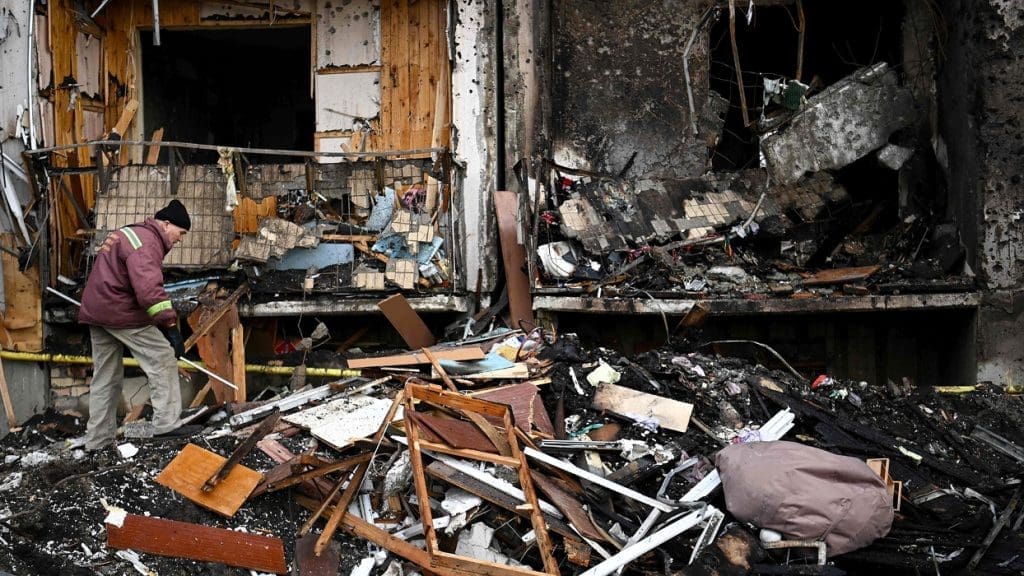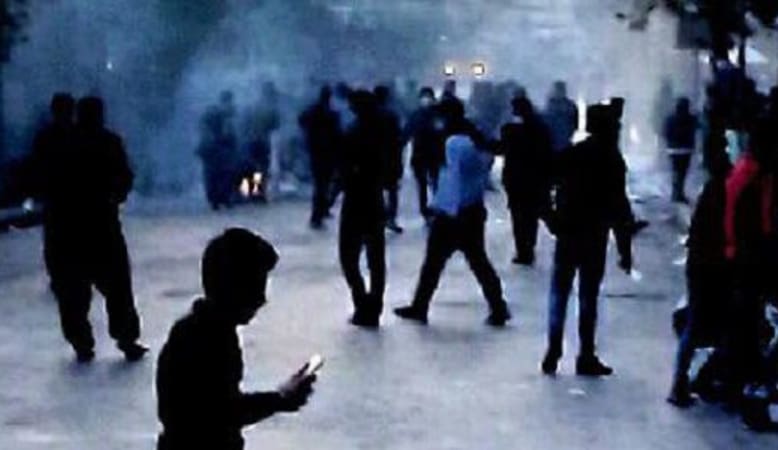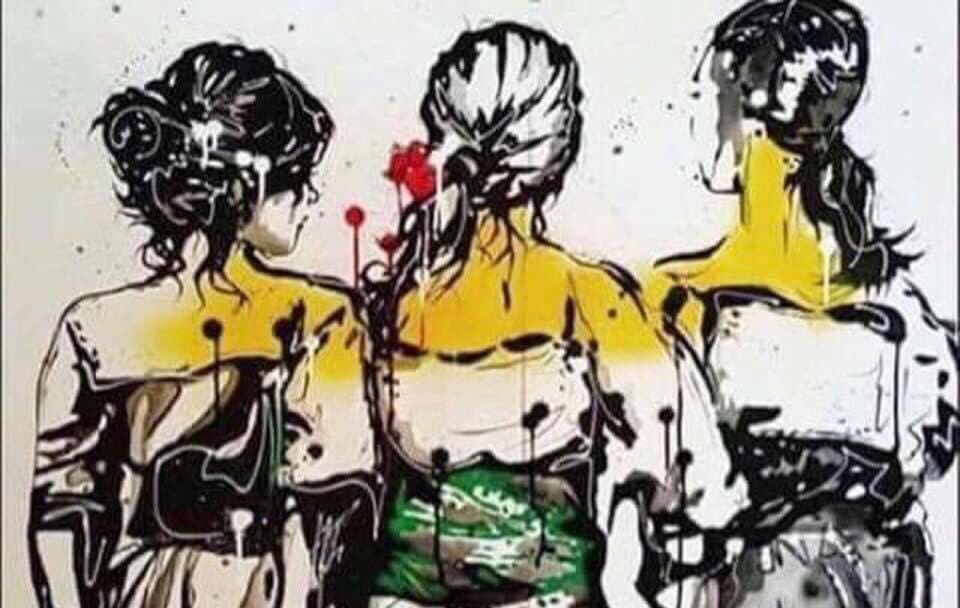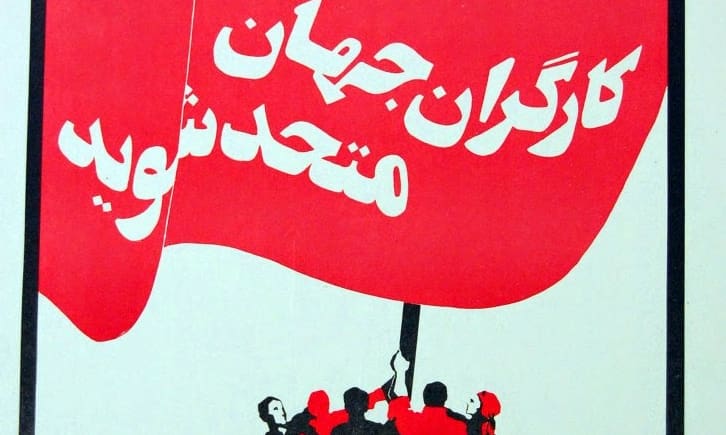Addressing Russian Propaganda
by an anonymous Ukrainian anarchist for their new site, praleski
26 February 2022 (original post)
Propaganda is only powerful because we are weak and lack connection to each other. We still haven’t learned how to analyze sources. Profit-oriented social media networks are increasingly our main communication channels and are not well-suited for horizontal information sharing, as they create isolated bubbles alienating us from each other. Old media is centralized and biased, eliminating our voices, and we’ve lost control over the new media platforms. However, if we understand this reality, there may be a path forward.
We shouldn’t give too much credit to ideologues or useful idiots; they’re not smart enough to turn people into media-zombies. People make zombies of themselves. Russian state actors are practically unable to create new ideas. Fortunately for them, the old ideas are sufficient to meet their aims. This article will address the most commonly reproduced Russian propaganda narratives on the topic of their foreign affairs—especially Ukraine—over roughly the last decade.
“I don’t really get what’s going on, so I’m not going to involve myself.”
Since at least 2014, Russian propaganda has not necessarily aimed to convince the consumer to support Russia directly—it’s not an easy task and it’s complicated to create a universal narrative for such a purpose. It’s much easier to neutralize those who are unaware or undecided. In this kind of haze, it’s easier to push narratives suitable for the Russian government. This is why the field is so overwhelmed with fake news—the crazier and more emotional the better—creating a destabilizing sense of chaos. This lack of clarity intentionally dissolves the boundaries between real facts and total fiction. In this context, actors with the ability to spam all accessible space quickly from the most bots are the most successful.
“It doesn’t matter what I do.”
All of us know this feeling, as it somewhat reflects our realities. We are alienated from decision-making processes that influence our own destinies. If we accept this as the full truth, we may not take action. To address this devastating feeling, many turn to conspiracy theories in order to gain some (even if imaginary) confidence and agency. This process may be even worse than inactivity because these theories primarily push rightwing values, narrowing windows of opportunity for us and those around us.
The only way to actually address this feeling is to take destiny into your own hands, test the boundaries of possibility, make errors, take responsibility for them, and move forward. It’s definitely more fun and offers more hope than going crazy out of powerlessness.
Russia as a pole against global hegemony and a “uni-polar world”
The concept of the polar world springs from Eurocentrism, broadly. Historically, the Cold War and the bipolar system were simple and convenient Western cultural narratives connected to countering the threat from the East. Because of this, the concept persists. However, modern Russia isn’t a significant global player in economics. You don’t need bombs to destroy Russia; economic sanctions would suffice. Russia is also no longer a cultural touchstone. Still, some who are nostalgic or stuck in the past imagine it to be one of the biggest global players—with positive or negative connotations, depending on with whom you’re speaking. Leftists see Lenin, rockets spaceships, and Gagarin, and hegemony of the proletariat; conservatives see Lenin Stalin, spaceships nuclear rockets, and hegemony of the proletariat Communists.
Russia itself doesn’t have any future projects. It relies on its imaginary bright past rather than a positive vision of the future, reaping content from different epochs with varied success. This situation attracts some conservatives, who see Russia as the last stronghold of tradition, just as their predecessors saw the East through an orientalist lens more than a hundred years ago.
On the other hand, Russia is also attractive for some who authentically oppose conservatives, from the lens of anti-colonial and antiracist movements. These movements’ theoretical bases were formed parallel to the establishment of academic post-colonial studies and burgeoning national liberation movements in the periphery. Both derived critical components of their foundations from Marxism. Anti-colonial approaches within the Marxist tradition are directly connected to the work of Soviet theorists from the 1920s, when Soviet Russia needed international support. The Soviet Union was developing the idea of the world internationalist revolution, and was directly supporting antiracist and anti-colonial movements across the world.
It’s true that if you only read the texts of that era, especially in comparison with Western academic texts of the time, you would have a hard time believing that modern Russia could be the same “prison of nations” as Lenin described Tsarist Russia. The colonial history of the Soviet and Russian empires is a blind spot for most. This blindness makes it easier to believe that anti-colonial movements on the periphery of the USSR and Russia are solely made up of nationalist reactionaries supported by the West.
While Russia is unable to define and control discourse about itself, it can take advantage of narratives established in the West. Effective pro-Russian narratives are not intentionally crafted, but emerge through trial and error. Ironically, the West created and used frameworks against Russia that Russia is now using to restore and stabilize its own colonial power. People who actively oppose the West’s colonialism may end up supporting Russia’s because of their lack of awareness of the history of the defeated.
Western “Russophobia”
First of all, the term Russophobia was invented by Russian antisemites to legitimize repression against Jewish populations in the Russian Empire. Without going too deep into historical conversations, we should admit that empires which held significant colonized Slavic populations, like the Austro-Hungarian and German empires, formed an ideological complex which could be called anti-Slavic. This concept hit its climax under German National Socialism. For the Nazis, Russians represented the essence of everything Slavic. After the fall of the Third Reich, these anti-Russian ideas were partially integrated into the broader anti-communist ideology of Western conservatives. They used “Russian” as a synonym for “communist” and the whole multi-ethnic population of the Soviet empire was reduced to an image of “Russian.” This dehumanized figure of the “Communist from Russia,” which you can see in the anti-communist imagery of the 1950-80s, is easy to mix up with orientalized visuals from the nineteenth century.
For leftists too, the image of the Russian was strictly connected with their own idealized communism. They were accustomed to standing up for Russian communists practically as a reflex, allowing them to support Soviet imperialism by default. Again, Russian propaganda doesn’t invent anything new, but uses old narratives of the West for its own purposes. Any struggle against Russian hegemony they would call “Russophobia.”
Russian “antifascism” and Putin’s “antifascist” mission
In “the country that defeated fascism,” no serious theory of fascism ever emerged. For the common Soviet citizen, fascism meant simply the quintessence of evil without any clear substance. Though the term was definitely connected to the Second World War, which in Russia is called the Great Fatherland War, the concept of the “Great Fatherland War” does not exactly have the same meaning as “World War Two.” The First Fatherland War was the war with Napoleon in the nineteenth century. The Great Fatherland War started in 1941 with the German invasion of the Soviet Union and ended officially with German capitulation on the 9th of May, Moscow time.
The difference from the Western conceptualization of this war is that in the Russian context it is seen as a continuation of Western invasions: from the Teutons in the thirteenth century, to Polish troops in the seventeenth century, to Napoleon, and Hitler. The Soviet Union would continue taking part in the Second World War beyond May 1945, fighting Japan, but this is not included in the idea of the Great Fatherland War.
This concept developed with time and wasn’t concrete during the events themselves. The more time that passed after the end of the war, the more important it became for the national myth. The main iconography of the Second World War was stabilized in the seventies. During the late nineties, and particularly after Putin’s declaration of the 9th of May as Victory Day, May 9th became the main patriotic event in Russia. There are really only two holidays in Russia that create some kind of unity for the nation: the New Year and Victory Day.
Victory is connected with the idea of an eschatological fight between good and evil. In this fight, the Chosen Russian Nation sacrifices itself, saving the world, defeating evil, asserting itself in the very process of sacrifice. The bigger the sacrifice, the bigger the role in victory—this is why the Soviet Union always tried to claim the largest number of victims and devastation in WWII. Russia continues to use this rhetoric of sacrifice to legitimize its claim as the main defeater of Nazi Germany. This is quite absurd, considering the fact that the majority of victims and devastation belonged to today’s independent states of Belarus and Ukraine.
According to dominant ideology, the main condition to achieve victory in the Fatherland War was the unity of the Russian nation. For Leo Tolstoy in War and Peace, this unity crystallized around the ideas of fatherland and ethics. In (post-)Stalin times, this unity was granted by the idea of a leader and a loyalty to Moscow. This means that everyone who wasn’t loyal to the leader personally, or at least the collective leadership of the Soviet Union, was a fascist.
In Soviet times, there was an understanding that the USSR defeated fascism as a family of nations (this text primarily uses the word “nation” to refer to the Russian concept of nation in ethnic and racial terms) led by a big Russian brother. During the past decade, this concept has shifted towards the idea that only ethnic Russians defeated fascism, while all other ethnicities were insignificant or disruptive. This shift was connected to the writings of the Russian Cultural Minister Vladimir Medinsky. The united Russians were seen as anti-fascist by their very nature—practically, this meant that the leader would be able to define what fascism is and isn’t. This is why today Putin doesn’t need any proof to claim there are “fascists in power” in Ukraine. He often uses the word nationalism as a synonym of fascism and Nazism: the idea of being Ukrainian itself means being a fascist traitor against Russians.
“De-Nazification of Ukraine” for Putin means bringing Ukrainians to obedience. It isn’t a fight with particular politicians or ideas, it is a fight against widely understood independence. This logic means that every kind of independence of “canonically Russian territories” is fascism and will have to be dealt with sooner or later. Such an antifascism is completely disconnected from any values or content and can be used to justify any action taken by the central Russian government.
“Liberating” Ukraine, defeating fascists, and Ukrainians welcoming Russian armed forces
The Russian idea of nation uses not only ethnic othering to define its own boundaries (which is common to many nationalisms), but also the idea of the “corrupted Russian.” Othering in this sense generally refers to people who are not considered white, including populations from the Caucasus, Central Asia, or elsewhere within the Russian borders. However, the role of “corrupted Russian” is played by other Slavic ethnicities as well, such as Ukrainians or people of Belarus.
A particular example is the use of a story of Ukrainian General Mazepa, which was one of the primary cultural references in Russia during its nation-building. During the repression of the 1930s, ethnic deportations were massive. As they continued during the war, they began being justified through accusations of whole nations’ collaboration with Nazis. Soviet and later Russian ideologues love to mention collaborator units formed by Nazis during the war, composed of different ethnic groups in the USSR. By creating this figure of traitor nations, they can leave out the fact that most of the collaborators were Russians, and legitimize colonial politics and ethnic repression.
Russia sees Ukrainian territory as historically Russian. In this view, Ukrainians are part of the Russian nation, co-opted and polluted by the West, much like Tolkien’s orcs and elves. This view also posits that the “healthy” part of Ukrainian society is suffering under the yoke of Ukraine (meaning the West and fascists) and is hungry to reunite with the Russian nation, to speak the Russian language, and to kiss the boots of Russian power. Only fascists and Western agents can be against these essential needs.
Many Russian soldiers and the general public truly believe that they will be met as liberators [right in the moment of creating this text, more and more news are coming out which reflect the shock of Russian soldiers realizing this is not so]. The annexation of Crimea and the propaganda successes of 2014 were so overwhelming that they might even believe as much in the Kremlin. At this moment, most Ukrainians are desperately defending themselves, volunteering to join their territorial defense forces. Russia is seen as an occupier and a threat to the very existence of Ukrainians, not only in abstract terms (such as their existence as a nation) but in concrete terms, as a threat to individuals who will not submit to Russian power.
Russia has denied the very existence of “Ukrainians” in its own propaganda for so long that they have started to believe it. This also means that average Ukrainians have reason to expect from Russia actions on par with those committed by Nazis during the Second World War. Ukrainian president Zelenskyy mentioned in a recent speech that all the events are reminiscent of the summer of 1941. The Russian side is filling social networks with statements and videos that only support these expectations.
“Russian speakers are at risk in Ukraine”
The issue of so-called oppression of Russian-speaking populations in Ukraine is directly linked to the discussion of language. Even now, after all these years of conflict, a majority of the population is bilingual rather than monolingual. Russian and Ukrainian are very similar and it’s not a big challenge to learn Ukrainian in several months as a Russian speaker. As a person living in the country, watching TV and consuming media in general, you can barely avoid learning it. If you don’t understand Ukrainian, it’s basically a political statement.
On the other hand, for economic reasons, most cultural production (books, music, and cinema) in Ukraine has largely been produced in the Russian language in order to have an entrance to the bigger Russian market. That is to say, there are no reasons to see the Russian language as endangered in Ukraine. Yes, there have been several pieces of legislation “for the Ukrainian language.” Official media, state bureaucracy, and education are mostly in Ukrainian. But no aspects of everyday life were ever regulated in terms of restricting the use of the Russian language.
This language issue is more or less all there is to discuss if we were to talk about ethnic discrimination in Ukraine. The distinction between ethnic Russians and Ukrainians is hard to tell without self-identification. Politicians have been trying to play up regional differences, connecting them to language, constantly. This entire distinction was mostly coming from above, rather than from the people. Even actual Nazis from the Azov regiment have used Russian as their language of communication.
Over time, this question has become more and more of an identity issue. Lots of people have started to use Ukrainian as a political statement. Many politicians (Ukrainian and Russian) use this identity issue to distract people from social issues, corruption, and so on. From a closer look, it seems that the issue of oppression of Russian-speakers is mostly a manipulation and is not connected to reality on the ground.
“Ukraine is a fascist state”
Following what is discussed above, a “fascist state” for Putin is any disloyal state on the territory which Russia perceives as its own. In fact, Ukraine is a much more pluralistic society than Russia. Political representation in parliament shifts with time following electoral logic. In his recent speeches, Putin has literally cited this as a sign of a failed fascist state. But political parties associated with the radical right are not very successful. Although the the right wing should not be underestimated, the general situation is far from under their control. Control of Ukraine is dispersed among many actors—in contrast to Russia.
It seems that Ukrainian state institutions rarely use ethno-nationalist rhetoric, even during war. Zelenskyy is making statements appealing to Russians in the Russian language, trying (at least rhetorically) to distinguish between the Russian state and Russian people, and hopefully ignite their disobedience to the war effort.
“Russia is acting preventatively, Ukraine is a threat”
The rhetoric of the Russian state is very similar to that which they used during their invasion of Georgia in 2008, which they called “Enforcing the Peace.” Ukraine has invested significantly in defenses since 2014, but even if they wanted, they could never reach a capacity to attack Russia. The so-called Peoples’ Republic of Donbas was backed by the Russian army from the very beginning. Attacking them would mean attacking Russia. It doesn’t seem logical to assume that Ukraine would have risked taking on such an attack. Western military support was hardly substantial. The lethal weapon contributions only increased in the few weeks before this recent invasion as a reaction to Russian preparations for invasion, and even then, the weapons delivered to Ukraine are only useful for defense. This purported attack on Donbas was merely an image, rather than an impending reality.
Russian rhetoric isn’t grounded in fact-checking or research, but is rather invented and tends to follow a typical victim-blaming storyline. It wouldn’t have mattered what Ukraine chose to do; even an ounce of will to resist or assertion of sovereignty would be interpreted as a threat to Russia. Having the means to resist increases the severity of this perceived threat. Even talking to Russia as equals is perceived as aggression. Putin quoted the old aphorism, clearly referencing rape, in describing his decisions regarding Ukraine: “Whether you like it or not, you should bear it.”
Conflict as a clash between Russia and NATO
As stated before, NATO has no significant presence in Ukraine. It has hardly any soldiers or weapons, and no military bases. Even now in a situation of full-scale invasion, they are only sending weapons and are clearly avoiding any direct confrontation with Russia. The very idea that Russia has any claim on the territory of Ukraine endangers all countries that Russia sees now (or will see in the future) as their canonical territories.
This feeling of danger is pushing locals more into the arms of NATO than any actions from NATO itself. Looking at Georgia and even Finland, you can see the impact that this threat has on internal discussions about joining NATO. The war in 2014 was a Christmas present for NATO, which until then had quite a hard time in Europe, and afterwards faced an unending revival.
This argument is usually linked to the conception that any politics is a subset of geopolitics. This assumption doesn’t consider the agency of individuals, societies, or states that are too small for the global stage. This thinking is also a type of conspiracy theory in which all actions are fueled by this or that superpower. This is also usually an expression of the spectator’s Big Brother complex, a lens through which nothing can happen without the actions of “us,” the global actors, good or evil.
And it implies the usage of familiar explanatory models in place of actual analysis from the ground. Local perspectives might be used, but only filtered through expert institutions of the Metropoles. This analysis becomes a self-fulfilling prophecy. Ignoring locals and their actions or perspectives makes them disappear from the media, cuts them off from support, and in a crisis situation like right now, could literally mean extinction.
“Two imperialisms are the same”
The default anti-military position is that when two imperial powers fight each other, you don’t take a side. This position is convenient but it’s not the situation that’s happening. It’s absolutely clear that Russia, with its overwhelming military and economic power, is trying to take full control of its ex-colony. Russia might not be a global player but it is absolutely a regional hegemon. Ideologically, these countries are totally different now. Russia is a political black hole, everything falling into its gravitational field disappears. From the total shutdown of political life in the already occupied regions of Ukraine, to the support of all sorts of rightwing tendencies everywhere they reach, Russia is the most powerful rightwing force in the region. In Eastern Europe, the Caucasus, and Central Asia they are financing local Nazis, lobbying for homophobic laws, militarizing countries, deepening ethnic conflicts, supporting dictators, and simply extinguishing peoples’ uprisings with blood.
There aren’t two imperialisms here, there’s just one imperialism against the people.
You should choose your side. It might be too late, even the very moment you are reading it.
Featured image source: praleski





